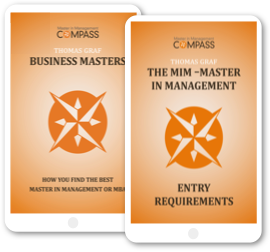Comparing the MBA vs Master in Management (MIM) - Can Master in Management (MIM) programs be alternatives to the Master of Business Administration (MBA)? What are the best MBA alternatives? What is the difference between MIM programs and Master in Business Administration (MBA) programs? Of course MIM and MBA have similarities – because both are postgraduate management programs – but still differ in several aspects. Here are the key differences of an MBA vs a Masters in Management.
- Search for Masters in Management (MIM): More than 600 MIM programs in our database
- Search for Masters of Business Administration (MBA): More than 2,000 MBA programs in our database
Key Differences between MBA vs Master in Management (MIM)
1. Age in MBA vs Master in Management (MIM)
MIM programs usually do not require professional experience although they are open to young professionals who have been working for some time, mostly up to a year. As a result, the Master in Management students are generally much younger than fulltime MBA students, at some schools the average age is 23 years (with a range from 20 to about 27 years) compared to the average age of 27 to 32 in MBA programs.
2. Professional experience in MBA vs Master in Management (MIM)
Professional experience of Master in Management students does not play a major role during the studies, whereas MBA programs gain a lot of value from the professional experience the students bring into the course discussions. So, comparing MBA vs Master in Management in a nutshell: Master in Management programs are primarily designed for talents in their early career stages right after their undergraduate degree or after about one year in job. MBA programs, by contrast, target people with a minimum of two or three years of professional experience.
3. Tuition fees in MBA vs Master in Management (MIM)
As for the tuition fees, the Master in Management programs are cheaper than MBA programs. Whereas the most expensive fulltime MBA program in Europe – offered by the London Business School – sums up to over € 70,000 (August 2013), the most expensive MIM programs cost only about half of that. This may have to do with the different target groups of the masters vs MBA: young people who have not yet been able to earn and save much money on the MIM side, and experienced people in or aiming at leadership positions on the MBA side.
4. Curriculum and content in MBA vs Master in Management (MIM)
According to the Global MIM Survey 2012, MBA vs MIM programs overlap by about 30 percent. Both program types provide an overview of general management topics, foster team work, and use case studies to simulate real-world situations.
- MIM programs, however, focuses more on the theoretical side of the management field than the MBA. You may find subjects that require strong mathematical or analytical skills and the final dissertation may be research-oriented. This is the case for many Master of Science in Management programs (M.Sc.), and particularly when they require a first degree in business or economics. Accordingly, the MIM also provides theoretical fundamentals of management research and may even qualify for a PhD program.
- By contrast, MBA programs primarily emphasize the practical side. In an MBA program, for instance, you may never ask for the origins of accounting techniques such as the EVA (Economic Value Added, (c) Stern Stewart) but focus only on its appliance, instead. After having covered core subjects on managerial functions such as finance or accounting, you will concentrate on more integrative courses and analyze business cases from the practical position of managers. You may work on in-company projects integrated in your studies or engage in a business plan competition. Instead of a final dissertation, you may present a consultancy project rooted in real-world businesses and, by that, demonstrate what you have learnt throughout the program.
5. Admissions criteria in MBA vs Master in Management (MIM)
- GMAT: For MBA programs, business schools attach great importance to the Graduate Management Admission Test (GMAT) - particularly, when the school or program is renowned or highly ranked. Though many schools also offer the GRE or their own on-campus tests as alternatives, the GMAT is still an important means to select MBA students. Comparing MBA vs Master in Management (MIM) programs, business schools seem to increasingly require the GMAT. According to the Global MIM Survey 2012, 40 percent of the MIM programs require the GMAT - even though individual interviews with MIM program managers indicate that the grade in the first academic degree is considered more important than the GMAT.
- Professional experience: Looking at MBA vs Master in Management programs, MBA programs do require professional experience whereas MIM program do not. There are Master of Business or Management programs, of course, that target senior managers (Search for Masters in Management for Executives here). Following the Financial Times Master in Management Ranking and to avoid confusion in terminology, however, we treat only those programs as "MIM programs" that are open for graduates without professional experience.
6. Reputation in MBA vs Master in Management (MIM)
The MBA is the traditional degree for postgraduate studies in management. Therefore, the MBA is still more known among HR managers than the MIM. Nevertheless, it seems reasonable to expect MIM programs gain popularity due to their increasing proliferation: 83 percent of the institutions that offer MIM programs face an increasing number of applications. As for the reputation of MBA vs Master in Management programs, two points can be made at the moment:
- First, the MIM is primarily a European phenomenon as 68 percent are offered in Europe - even though US business schools such as Thunderbird are catching up. Presumably most US firms will assess the MBA as more valuable than the MIM if they know the latter at all.
- Second and maybe more important, MBA and MIM are degrees for different target groups - the former for young professionals and professionals, the latter for graduates. Hence, it seems very likely that HR managers do not perceive MBA vs Master in Management (MIM) in competition to each other but as different degrees for different target groups who apply for different positions.
7. Career Perspectives in MBA vs Master in Management (MIM)
The MIM is a degree for graduates without or with only little professional experience. Hence, Master in Management graduates start their first job after the MIM and, by this, apply for entry positions. By contrast, the MBA is for people who are in business already for several years. Hence, they will become "experienced hires" for companies and apply for more advanced jobs, for example leadership or management positions.
MBA vs MIM: Which degree to choose?
Overall, the difference between MBA vs Master in Management is important to consider. The Master of Science or Master of Arts in general management is a further qualification for young, talented and ambitious people, who perceive their bachelor degree as not sufficient for their early career plans. MBA students, on the other side, usually have started their careers already and want or need new knowledge, analysis tools, and networking opportunities - for example to change their function or line of business, to meet the challenges of a promotion, or simply to increase their outside career options.
- MIM vs MBA Masters degree in Management in a nutshell: The MIM helps graduates to start a career while the Master of Business Administration (MBA) helps young professionals and professionals to enhance and develop their management career.
How to assess the quality of management programs
An interesting aspect when searching for general management programs such as the MIM and the Master of Business Administration (MBA) is: How do you assess the quality of the program? Here are some tips:
- Check the accreditations: AMBA certifies Management Programs, EQUIS and AACSB certify institutions. Once an institution has the EQUIS or AACSB accreditation all programs are automatically accredited too.
- Check the relevant Rankings: the Financial Times Master in Management Ranking, the Financial Times Global MBA, Distance MBA, and Executive MBA Rankings, the Financial Times European Business School Rankings and also the Business Week MBA Ranking and the MBA Ranking of the Economist. In addition, make yourself familiar with the criteria by which the rankings are made. You can find these criteria in special reports published on the respective website.
- Talk to your potential future employers: Do they know the school of your interest? Do they have experience with graduates from there? Do they actively recruit on campus? Which career paths do they offer with a MSc or MBA from that school?
- Talk to Alumni of the program that you are interested in: Ask the Admissions department to bring you in contact with alumni with a minimum of one year after graduation. Ask them if they would do the program again and how they benefitted from it.
Recommended websites on the MBA
 www.mba-compass.com: Your platform for finding MBA programs all over the world, founded by Thomas Graf. A special filter function allows you to search explicitly for programs that require the GMAT or alternative tests vs. programs that do not require such tests. Background articles, for instance a comparison of the MBA ranking methodologies of Financial Times, Businessweek, Economist, Forbes and US News as well as a Testimonial section with reports from MBA alumni.
www.mba-compass.com: Your platform for finding MBA programs all over the world, founded by Thomas Graf. A special filter function allows you to search explicitly for programs that require the GMAT or alternative tests vs. programs that do not require such tests. Background articles, for instance a comparison of the MBA ranking methodologies of Financial Times, Businessweek, Economist, Forbes and US News as well as a Testimonial section with reports from MBA alumni.
 www.mba-journal.de: Website of the German journalist Bärbel Schwerfeger. Since 1985, Schwertfeger is publishing in Germany's most renowned newpapagers, magazines, and journals primarily in the area of business, management education, and personal development. Her website is full of background articles and news about business schools, MBA programs, and Executive Education. Mostly written in German but also including some English articles.
www.mba-journal.de: Website of the German journalist Bärbel Schwerfeger. Since 1985, Schwertfeger is publishing in Germany's most renowned newpapagers, magazines, and journals primarily in the area of business, management education, and personal development. Her website is full of background articles and news about business schools, MBA programs, and Executive Education. Mostly written in German but also including some English articles.
Further links to MBA-related articles
By Thomas Graf
FAQ - Frequently asked questions
MBA vs Master in Management programs show several differences in who the target groups are. Generally speaking, MBA programs are intended for professionals with job experience who want a practically focused degree to apply for higher positions like leadership and management positions, thus furthering their careers. In comparison, MIM programs are intended for young graduates looking to start their careers and are more theoretical.
Increasingly, there are MIM programs using the same entry exams as MBA programs do. While the age group skews younger and the focus is more theoretical, MIM programs with a stronger focus on matching MBA admission criteria can be a viable alternative for students wanting to build on their knowledge, especially in Europe.
Cost-wise, MBA vs MIM programs find the former vastly more expensive than the latter. Even the most expensive MIM program is only half as expensive as the highest priced MBA program. This is due to their different target groups: MBA students are expected to have already been working for a time, and thus had the opportunity to earn and save up enough money to pay this type of higher tuition.









